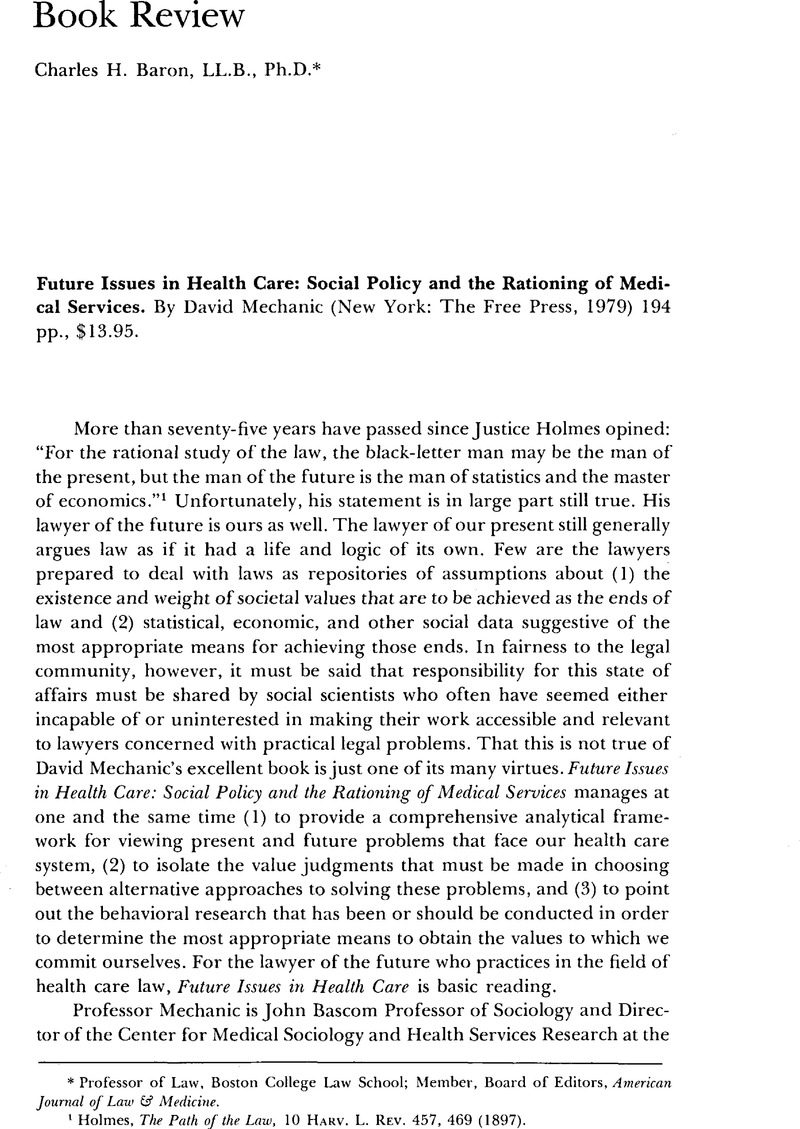No CrossRef data available.
Article contents
Future Issues in Health Care: Social Policy and the Rationing of Medical Services. By David Mechanic (New York: The Free Press, 1979) 194 pp., $13.95.
Published online by Cambridge University Press: 24 February 2021
Abstract

- Type
- Book Review
- Information
- Copyright
- Copyright © American Society of Law, Medicine and Ethics and Boston University 1979
References
1 Holmes, The Path of the Law, 10 Harv. L. Rev. 457, 469 (1897).Google Scholar
2 D. Mechanic, Future Issues in Health Care: Social Policy and the Rationing of Medical Services 125 (1979).
3 For example, consider his discussion of problems of care of the large numbers of Americans who suffer from “depression, anxiety, psychophysiologic discomforts, insomnia, unhappiness, and alienation (U.S. President's Commission on Mental Health 1978)“:
Although the appropriate treatment of such persons is not established, large numbers of them are found in primary medical-care settings (Shepherd, Cooper, Brown, and Kalton 1966). Physicians feel at a loss in knowing how to deal appropriately with these patients, and only a small minority are ever referred for specialized care. Those who come or are referred to psychiatric settings tend to have more severe symptoms and social and cultural orientations that enhance their receptivity to psychiatric care (Greenley and Mechanic 1976). The majority of patients, however, receive whatever treatment they obtain from primary-care physicians. Estimates vary a great deal as to what proportion of patients in general medical settings suffer from these types of symptoms, but there is wide agreement that they constitute a considerable burden of demand on ambulatory-care facilities (Andersen, Francis, Lion, and Daughety 1977). The distress associated with these patients’ problems triggers a demand for medical service (Tessler, Mechanic, and Dimond 1976), and such patients are often recipients of intensive medical and surgical care that achieves little of value. Support, reassurance, and relief of suffering through pharmacological intervention, in contrast, are of some use. Although psychoactive drugs are used extensively in medical practice (Parry, Baiter, Mellinger, Cisin, and Manheimer 1973), we do not know very much about when they are used. The mild tranquilizers such as Valium and Librium are among the most frequently used drugs in ordinary medical practice, and many of the prescriptions of barbiturates, amphetamines, and other commonly used drugs are a response to the distress syndromes described.
Id. at 80-81 (emphasis added).
4 Id. at xii. The author continues:
I consciously have chosen the more inciting term because I believe it is more honest to describe things as they really are. The choice of terms is often a means of deception. Middle-class Americans, for example, believe that it is only the poor who receive rent subsidies, rarely defining the deductions of mortgage interest on their taxes as such a subsidy. Such self-deceptions in the aggregate have a distorting effect on rational discussions of social policy. We all should accept the fact that medical care in America, as elsewhere, is rationed.
5 Id. at 95-96.
6 Id. at 96.
7 Id. at xi.
8 Id.
9 Id. at 104.
10 Id. at 106-07.
11 id. at 109.
12 Id. at 117. The author further states:
There is growing indication that patient rights are of increasing concern to the Congress and to the Executive Branch. Should further intervention efforts be undertaken, it would be desirable to avoid response to each salient problem by specific rule formulation. A more constructive approach would encourage programs to develop adequate grievance mechanisms, ombudsmen, and other devices that facilitate communication and feedback relevant to troublesome problems. While medical care involves real conflicts of interest, there are many areas where good will, effective feedback, and mutual respect would enhance the quality of services far more than any attempt to govern behavior by the proliferation of rules.
Id. at 121.
13 Id. at xii.
14 Id.
15 Id. at 173.
16 Id. at 166.
17 Id. at 145.


